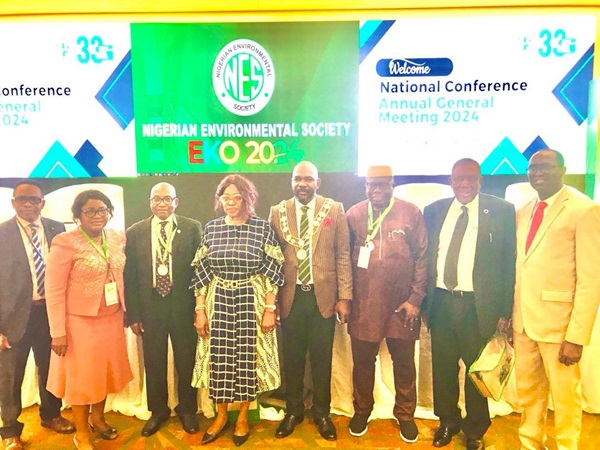
Governor Babajide Sanwo-Olu of Lagos State has emphasised the critical need for environmental resource management.
According to him, conservation and protection have become urgent and complex as populations grow, industrial activities intensify and natural resources face unprecedented pressures. He stressed that responsible management of these resources is essential.
The governor shared these remarks at the 33rd National Conference and Annual General Meeting of the Nigerian Environmental Society (NES), tagged “Eko 2024,” held on Wednesday.
A press release by NES president, Dr. Efegbidiki Okobia noted that the governor, represented by his special adviser on Sustainable Development Goals (SDGs), Dr. Oreoluwa Finnih lauded NES for its efforts in environmental protection, sustainable development and promoting environmental professionalism within Nigeria and beyond.
“This year’s theme is highly relevant to our current reality, as it calls for responsible management and protection of natural resources through advanced technology to achieve sustainable development,” he said. “Today, environmental resource management, conservation and protection have become urgent and complex as populations grow, industrial activities increase, and natural resources face unprecedented pressures. Responsible management of these resources is therefore essential.
“Lagos covers just 0.1 per cent of Nigeria’s landmass, yet 10 per cent of the nation’s population resides here. With 3,500 square kilometers—20 per cent of which is water—Lagos State takes environmental matters seriously. This approach requires strategic planning, intentional stewardship and a commitment to practices that balance human needs with ecosystem health, ensuring these resources remain vibrant and accessible for future generations. Our administration has made significant strides in advancing environmental sustainability and setting new standards for urban resilience across Africa.”
Addressing the challenges of rapid urbanization and climate change, Sanwo-Olu highlighted several initiatives: “We are committed to innovative policies and strategic programs that aim to build a cleaner, greener and more sustainable Lagos. A primary focus has been waste management. Through the Lagos Waste Management Authority (LAWMA), we have expanded waste collection efforts, launched the Blue Box Recycling Initiative and implemented waste-to-energy programmes. These initiatives reduce our reliance on landfills and foster a circular economy that benefits both the environment and our people.
“Lagos is also among the few African cities with a climate action plan. Earlier this year, we launched a plan aimed at achieving net-zero emissions by 2050. This ambitious roadmap includes clean public transportation, renewable energy development and sustainable urban planning, all of which demonstrate our commitment to reducing greenhouse gas emissions and enhancing climate resilience.”
He further emphasised the state’s efforts in greening and reforestation, saying, “We plant thousands of trees annually and encourage citizens to participate through initiatives like the One House, One Tree programme. These efforts are crucial for improving air quality and reducing urban heat, which are essential for community well-being. Recognising our vulnerability to flooding, we have also invested significantly in sustainable drainage systems and shoreline protection to manage water and reduce flood risks. Equally important is fostering a culture of sustainability through public awareness campaigns like Cleaner Lagos, which engage residents, schools and businesses in environmental stewardship.”
In his remarks, a professor of environmental law, Prof. Olanrewaju Fagbohun called for increased investment in technology-focused tertiary institutions, supported by subsidised credit from national development banks. He emphasised that such measures would strengthen Nigeria’s technological capacity for sustainable development.
Fagbohun, a former vice-chancellor of Lagos State University (LASU), added that for sustainable progress, the government must provide reliable, affordable electricity, invest in infrastructure and offer public guarantees on risk insurance. He suggested incentives to reduce upfront costs, such as subsidies, green bonds with preferential rates, long-term policy consistency, and the removal of barriers to improve coordination and policy alignment.
Reflecting on the event’s theme, “Environmental Resource Management, Conservation and Protection in the Global Emerging Innovative Technology for Sustainable Development,” Okobia stated that the 33rd National Conference and Annual General Meeting aims to bring environmental consciousness and sustainable projects to the forefront.
He called on all stakeholders to support NES’s mission as Nigeria’s foremost environmental watchdog.
Dignitaries in attendance included Dr. Eugene Ituah, Prof. Babajide Alo, Dr. (Mrs.) Mfon Usoro, Dr. Dorothy Bassey, representatives from various states across the country, among others.


